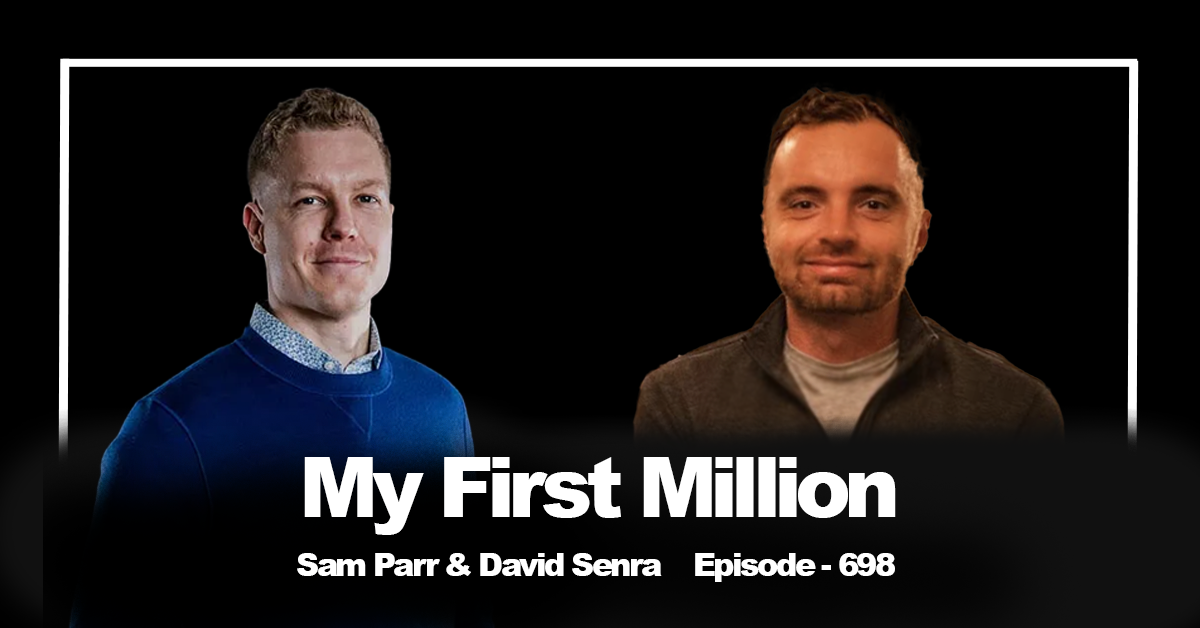This week on My First Million, Sam Parr sits down with a fellow titan of business podcasting, David Senra, the host of the incredible Founders podcast. If you love deep dives into the minds of legendary entrepreneurs, this episode is pure gold. David essentially brings the Founders podcast to MFM, dissecting the traits, obsessions, and often counter-intuitive strategies of the world’s most successful (and often most difficult) builders.
Forget the sanitized HBS case studies. David breaks down the “anti-b business billionaire” – figures like Jobs, Dyson, Dell, Walton, and Chouinard – highlighting their shared traits: high disagreeableness, extreme self-confidence, obsession with product quality, long-term vision, and often, a refusal to compromise that borders on maniacal. They explore why these traits seem necessary for outlier success and how these founders make the world bend to them.
David shares fascinating insights gleaned from reading hundreds of biographies, discussing everything from the Edisonian principle of iteration and why constraints are your friend, to the crucial difference between belief and ability, and why the best exit strategy is often death.
Here are the detailed key insights and takeaways (analyzed by David Senra):
1. The Anti-Billionaire / Savage Founder Traits:
- High Disagreeableness: They don’t bend to the world; the world bends to them. They refuse to compromise on product quality/vision, even when it seems absurd. They don’t need to please everyone. (Dyson’s relentless vacuum pursuit).
- Extreme Self-Confidence (Belief Before Ability): An unwavering conviction they can achieve their goals, often present long before proof exists. This fuels them through immense struggle. (Michael Dell’s early belief).
- Obsessed with Product Quality / The Activity: They find deep satisfaction and meaning in the act of building, inventing, and perfecting their craft. The work itself is the reward, not just the outcome. (Dyson on the factory floor; Jobs’ focus).
- Total Control (Often Necessary): Many maintain intense control, acting as the ultimate decision-maker on product details. Delegation is secondary to ensuring the vision is executed correctly. (Contrast Jobs/Dyson with Felix Dennis).
- Long-Term Orientation (Exit Strategy = Death): They build for endurance, not a quick flip. Thinking in decades reduces competition as most people focus short-term (Bezos). They often want to die owning the thing they built.
- Indifferent to Norms/Criticism: They follow their own internal compass, regardless of what others think or say.
2. Key Operating Principles & Strategies:
- Do What Works for Them: They develop unique methods and ignore external noise, focusing only on what gets them results (Tim Grover on Jordan/Kobe).
- Edisonian Principle of Design: Forget master plans. Focus on constant experimentation, immediate feedback, and relentless iteration. Build, test, learn, repeat. (Apple’s iterative demos to Jobs).
- Constraints Force Innovation: Limited resources (capital, time) are often an advantage, forcing creativity and focus. Don’t be afraid to start small. (Sam Walton starting in rural Arkansas; Dell with $1k).
- Go Slow to Go Fast: Invest heavily in learning and mastering the fundamentals early on, even if it seems slow. This builds a foundation for explosive, compounded growth later (Walton’s first 5 years). Don’t interrupt the compounding by jumping between unrelated ventures.
- Freedom is Paramount: Retain control over what you work on. Success comes from loving the activity itself (Sam Zell quote).
3. Learning from History (David’s Method):
- Biographies are Key: David’s deep understanding comes from obsessively reading biographies and autobiographies of history’s greatest entrepreneurs.
- Identify Patterns: He looks for recurring themes, traits, and strategies across different founders and eras.
- Apply the Lessons: Translates historical insights into actionable principles for modern builders.
4. Notable Examples Dissected:
- James Dyson: 14 years, 5,127 prototypes, battled mediocrity, obsessed with invention, still deeply involved at 75.
- Michael Dell: Started with $1k, extreme competitor, belief preceded ability, used constraints.
- Sam Walton: Slow start, deep learning, then explosive scaling with Sam’s Club by applying learned principles.
- Steve Jobs: Adopted, driven by “seeking revenge” on circumstance, product obsession, total control.
- Yvon Chouinard: “Dirtbag climber,” reluctant entrepreneur, product quality obsession, Patagonia.
- Todd Graves (Raising Cane’s): Modern example of extreme simplicity and focus on one product.
Final Thought:
David Senra delivers an intense dose of entrepreneurial reality. Building something truly legendary often requires an unconventional, sometimes difficult, personality fueled by deep obsession, unwavering self-belief, and a long-term perspective that defies typical business cycles. By studying the lives of these “anti-b billionaires,” David extracts timeless lessons on grit, strategy, and the power of bending the world to your will. This is essential listening for anyone serious about building.
Find David Senra & Founders Podcast: FoundersPodcast.com
Until next time,
The Podcast Notes Team





